Leadership, Management and Operations at Starbucks: Report
VerifiedAdded on 2020/06/06
|11
|3366
|65
Report
AI Summary
This report analyzes the operations management of Starbucks, focusing on the roles of managers and leaders in achieving organizational goals. It explores the characteristics of effective managers and leaders, their applications in various situations (customers, employees, society, and suppliers), and the use of leadership theories like system, situational, and contingency leadership. The report also examines modern and classical management theories. Furthermore, it delves into key approaches of operations management such as Total Quality Management (TQM), Just-in-Time, Lean Production, Continuous Improvement, and Six Sigma, highlighting the importance of planning, managing, and coordinating within the organization. The report emphasizes the value of operations management in achieving organizational objectives, making it a valuable resource for students studying business management and leadership.
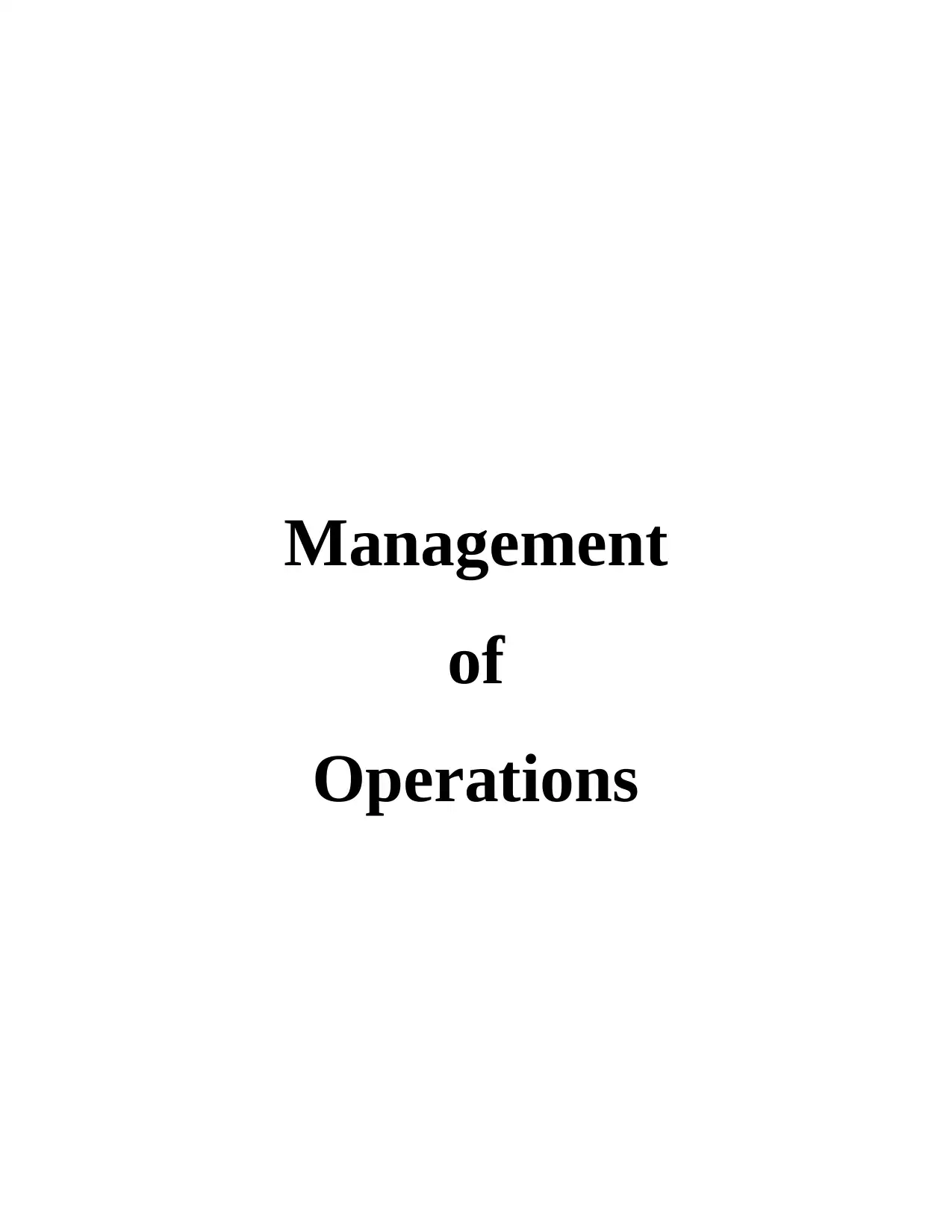
Management
of
Operations
of
Operations
Paraphrase This Document
Need a fresh take? Get an instant paraphrase of this document with our AI Paraphraser
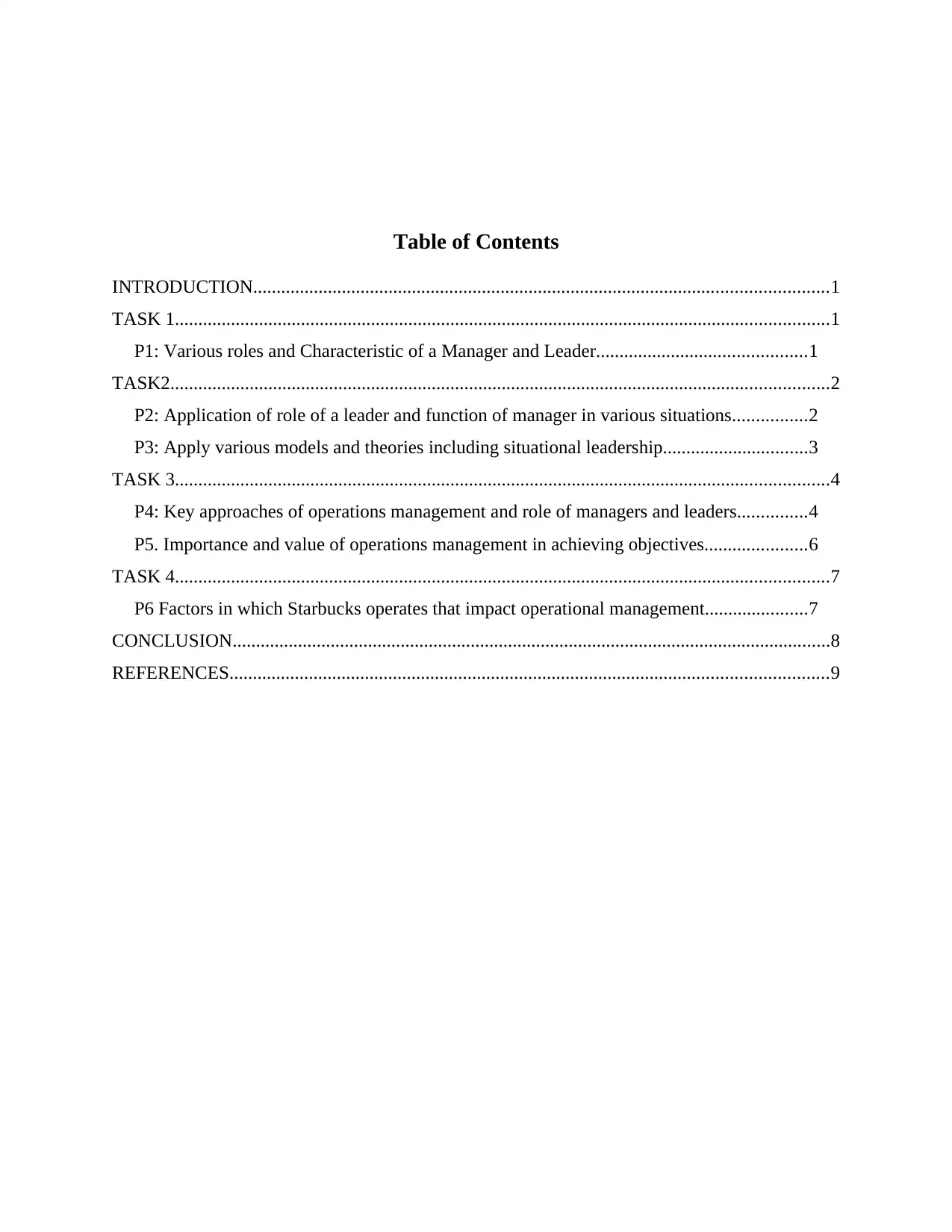
Table of Contents
INTRODUCTION...........................................................................................................................1
TASK 1............................................................................................................................................1
P1: Various roles and Characteristic of a Manager and Leader.............................................1
TASK2.............................................................................................................................................2
P2: Application of role of a leader and function of manager in various situations................2
P3: Apply various models and theories including situational leadership...............................3
TASK 3............................................................................................................................................4
P4: Key approaches of operations management and role of managers and leaders...............4
P5. Importance and value of operations management in achieving objectives......................6
TASK 4............................................................................................................................................7
P6 Factors in which Starbucks operates that impact operational management......................7
CONCLUSION................................................................................................................................8
REFERENCES................................................................................................................................9
INTRODUCTION...........................................................................................................................1
TASK 1............................................................................................................................................1
P1: Various roles and Characteristic of a Manager and Leader.............................................1
TASK2.............................................................................................................................................2
P2: Application of role of a leader and function of manager in various situations................2
P3: Apply various models and theories including situational leadership...............................3
TASK 3............................................................................................................................................4
P4: Key approaches of operations management and role of managers and leaders...............4
P5. Importance and value of operations management in achieving objectives......................6
TASK 4............................................................................................................................................7
P6 Factors in which Starbucks operates that impact operational management......................7
CONCLUSION................................................................................................................................8
REFERENCES................................................................................................................................9
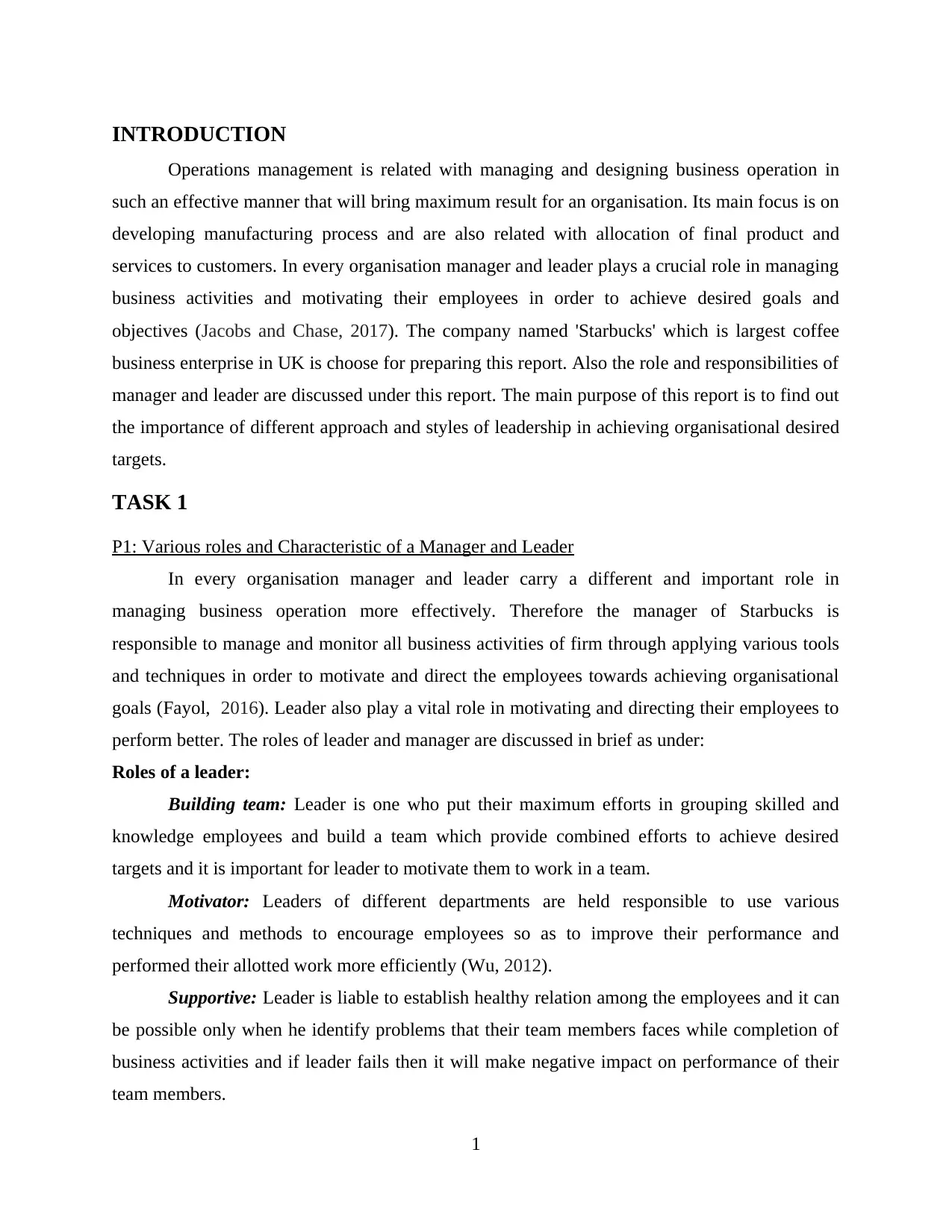
INTRODUCTION
Operations management is related with managing and designing business operation in
such an effective manner that will bring maximum result for an organisation. Its main focus is on
developing manufacturing process and are also related with allocation of final product and
services to customers. In every organisation manager and leader plays a crucial role in managing
business activities and motivating their employees in order to achieve desired goals and
objectives (Jacobs and Chase, 2017). The company named 'Starbucks' which is largest coffee
business enterprise in UK is choose for preparing this report. Also the role and responsibilities of
manager and leader are discussed under this report. The main purpose of this report is to find out
the importance of different approach and styles of leadership in achieving organisational desired
targets.
TASK 1
P1: Various roles and Characteristic of a Manager and Leader
In every organisation manager and leader carry a different and important role in
managing business operation more effectively. Therefore the manager of Starbucks is
responsible to manage and monitor all business activities of firm through applying various tools
and techniques in order to motivate and direct the employees towards achieving organisational
goals (Fayol, 2016). Leader also play a vital role in motivating and directing their employees to
perform better. The roles of leader and manager are discussed in brief as under:
Roles of a leader:
Building team: Leader is one who put their maximum efforts in grouping skilled and
knowledge employees and build a team which provide combined efforts to achieve desired
targets and it is important for leader to motivate them to work in a team.
Motivator: Leaders of different departments are held responsible to use various
techniques and methods to encourage employees so as to improve their performance and
performed their allotted work more efficiently (Wu, 2012).
Supportive: Leader is liable to establish healthy relation among the employees and it can
be possible only when he identify problems that their team members faces while completion of
business activities and if leader fails then it will make negative impact on performance of their
team members.
1
Operations management is related with managing and designing business operation in
such an effective manner that will bring maximum result for an organisation. Its main focus is on
developing manufacturing process and are also related with allocation of final product and
services to customers. In every organisation manager and leader plays a crucial role in managing
business activities and motivating their employees in order to achieve desired goals and
objectives (Jacobs and Chase, 2017). The company named 'Starbucks' which is largest coffee
business enterprise in UK is choose for preparing this report. Also the role and responsibilities of
manager and leader are discussed under this report. The main purpose of this report is to find out
the importance of different approach and styles of leadership in achieving organisational desired
targets.
TASK 1
P1: Various roles and Characteristic of a Manager and Leader
In every organisation manager and leader carry a different and important role in
managing business operation more effectively. Therefore the manager of Starbucks is
responsible to manage and monitor all business activities of firm through applying various tools
and techniques in order to motivate and direct the employees towards achieving organisational
goals (Fayol, 2016). Leader also play a vital role in motivating and directing their employees to
perform better. The roles of leader and manager are discussed in brief as under:
Roles of a leader:
Building team: Leader is one who put their maximum efforts in grouping skilled and
knowledge employees and build a team which provide combined efforts to achieve desired
targets and it is important for leader to motivate them to work in a team.
Motivator: Leaders of different departments are held responsible to use various
techniques and methods to encourage employees so as to improve their performance and
performed their allotted work more efficiently (Wu, 2012).
Supportive: Leader is liable to establish healthy relation among the employees and it can
be possible only when he identify problems that their team members faces while completion of
business activities and if leader fails then it will make negative impact on performance of their
team members.
1
⊘ This is a preview!⊘
Do you want full access?
Subscribe today to unlock all pages.

Trusted by 1+ million students worldwide
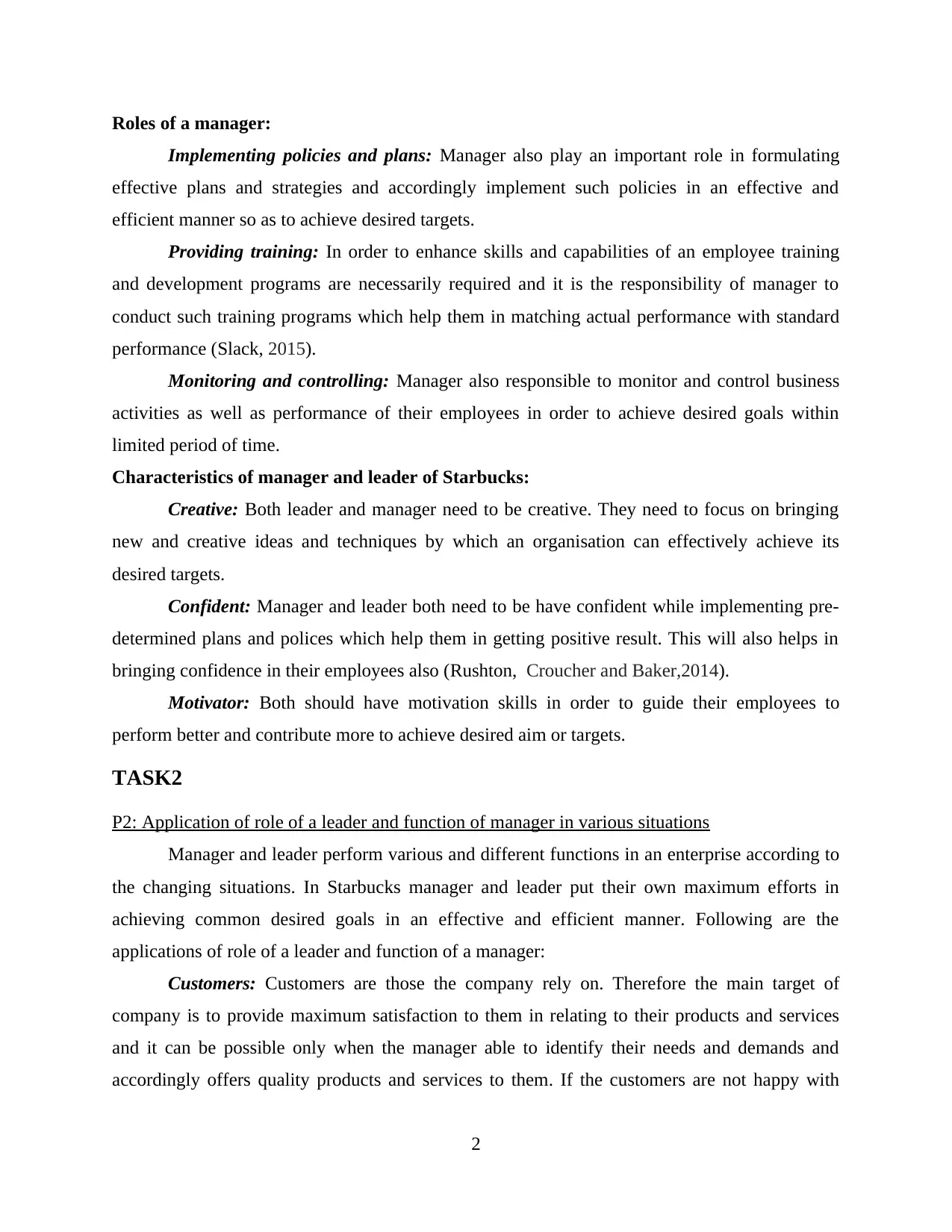
Roles of a manager:
Implementing policies and plans: Manager also play an important role in formulating
effective plans and strategies and accordingly implement such policies in an effective and
efficient manner so as to achieve desired targets.
Providing training: In order to enhance skills and capabilities of an employee training
and development programs are necessarily required and it is the responsibility of manager to
conduct such training programs which help them in matching actual performance with standard
performance (Slack, 2015).
Monitoring and controlling: Manager also responsible to monitor and control business
activities as well as performance of their employees in order to achieve desired goals within
limited period of time.
Characteristics of manager and leader of Starbucks:
Creative: Both leader and manager need to be creative. They need to focus on bringing
new and creative ideas and techniques by which an organisation can effectively achieve its
desired targets.
Confident: Manager and leader both need to be have confident while implementing pre-
determined plans and polices which help them in getting positive result. This will also helps in
bringing confidence in their employees also (Rushton, Croucher and Baker,2014).
Motivator: Both should have motivation skills in order to guide their employees to
perform better and contribute more to achieve desired aim or targets.
TASK2
P2: Application of role of a leader and function of manager in various situations
Manager and leader perform various and different functions in an enterprise according to
the changing situations. In Starbucks manager and leader put their own maximum efforts in
achieving common desired goals in an effective and efficient manner. Following are the
applications of role of a leader and function of a manager:
Customers: Customers are those the company rely on. Therefore the main target of
company is to provide maximum satisfaction to them in relating to their products and services
and it can be possible only when the manager able to identify their needs and demands and
accordingly offers quality products and services to them. If the customers are not happy with
2
Implementing policies and plans: Manager also play an important role in formulating
effective plans and strategies and accordingly implement such policies in an effective and
efficient manner so as to achieve desired targets.
Providing training: In order to enhance skills and capabilities of an employee training
and development programs are necessarily required and it is the responsibility of manager to
conduct such training programs which help them in matching actual performance with standard
performance (Slack, 2015).
Monitoring and controlling: Manager also responsible to monitor and control business
activities as well as performance of their employees in order to achieve desired goals within
limited period of time.
Characteristics of manager and leader of Starbucks:
Creative: Both leader and manager need to be creative. They need to focus on bringing
new and creative ideas and techniques by which an organisation can effectively achieve its
desired targets.
Confident: Manager and leader both need to be have confident while implementing pre-
determined plans and polices which help them in getting positive result. This will also helps in
bringing confidence in their employees also (Rushton, Croucher and Baker,2014).
Motivator: Both should have motivation skills in order to guide their employees to
perform better and contribute more to achieve desired aim or targets.
TASK2
P2: Application of role of a leader and function of manager in various situations
Manager and leader perform various and different functions in an enterprise according to
the changing situations. In Starbucks manager and leader put their own maximum efforts in
achieving common desired goals in an effective and efficient manner. Following are the
applications of role of a leader and function of a manager:
Customers: Customers are those the company rely on. Therefore the main target of
company is to provide maximum satisfaction to them in relating to their products and services
and it can be possible only when the manager able to identify their needs and demands and
accordingly offers quality products and services to them. If the customers are not happy with
2
Paraphrase This Document
Need a fresh take? Get an instant paraphrase of this document with our AI Paraphraser
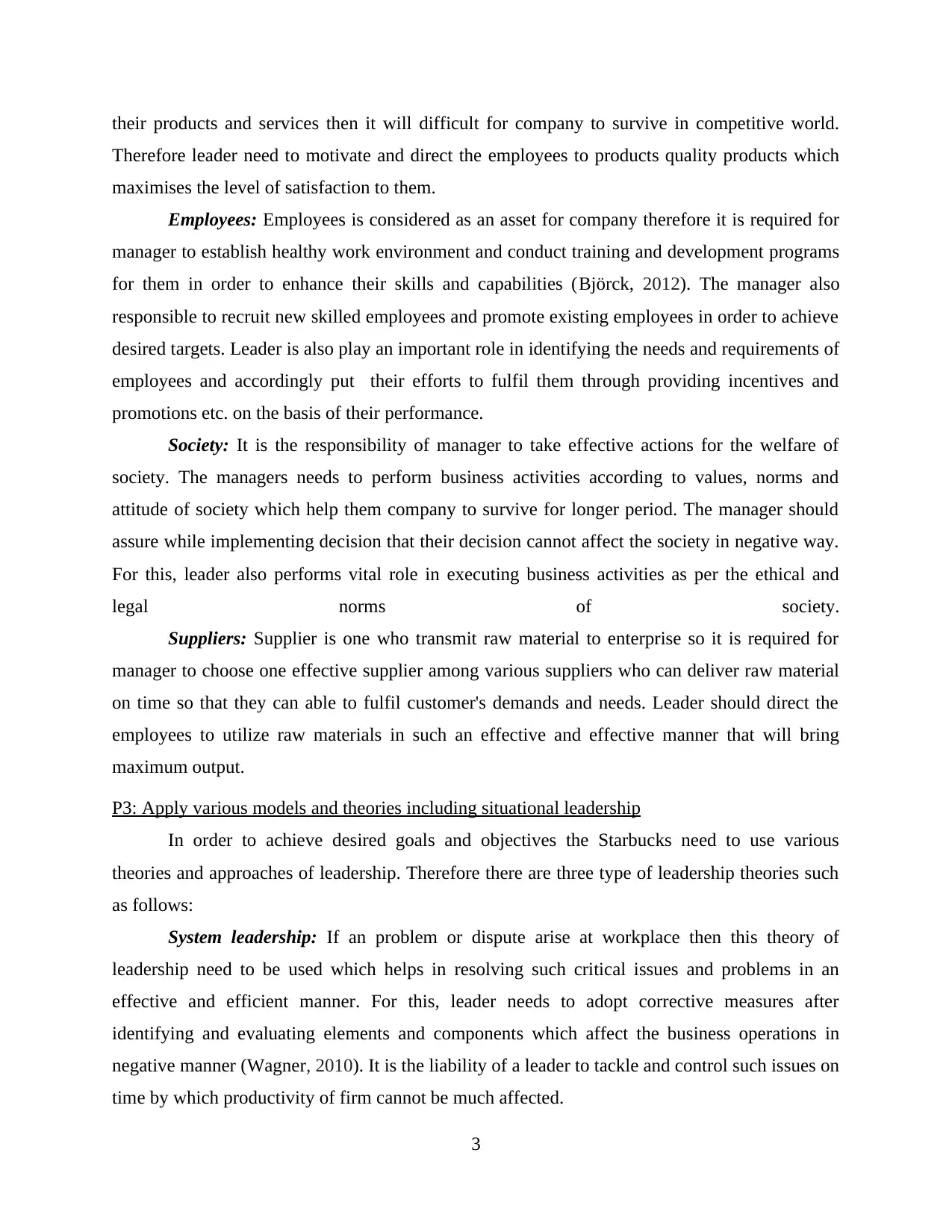
their products and services then it will difficult for company to survive in competitive world.
Therefore leader need to motivate and direct the employees to products quality products which
maximises the level of satisfaction to them.
Employees: Employees is considered as an asset for company therefore it is required for
manager to establish healthy work environment and conduct training and development programs
for them in order to enhance their skills and capabilities (Björck, 2012). The manager also
responsible to recruit new skilled employees and promote existing employees in order to achieve
desired targets. Leader is also play an important role in identifying the needs and requirements of
employees and accordingly put their efforts to fulfil them through providing incentives and
promotions etc. on the basis of their performance.
Society: It is the responsibility of manager to take effective actions for the welfare of
society. The managers needs to perform business activities according to values, norms and
attitude of society which help them company to survive for longer period. The manager should
assure while implementing decision that their decision cannot affect the society in negative way.
For this, leader also performs vital role in executing business activities as per the ethical and
legal norms of society.
Suppliers: Supplier is one who transmit raw material to enterprise so it is required for
manager to choose one effective supplier among various suppliers who can deliver raw material
on time so that they can able to fulfil customer's demands and needs. Leader should direct the
employees to utilize raw materials in such an effective and effective manner that will bring
maximum output.
P3: Apply various models and theories including situational leadership
In order to achieve desired goals and objectives the Starbucks need to use various
theories and approaches of leadership. Therefore there are three type of leadership theories such
as follows:
System leadership: If an problem or dispute arise at workplace then this theory of
leadership need to be used which helps in resolving such critical issues and problems in an
effective and efficient manner. For this, leader needs to adopt corrective measures after
identifying and evaluating elements and components which affect the business operations in
negative manner (Wagner, 2010). It is the liability of a leader to tackle and control such issues on
time by which productivity of firm cannot be much affected.
3
Therefore leader need to motivate and direct the employees to products quality products which
maximises the level of satisfaction to them.
Employees: Employees is considered as an asset for company therefore it is required for
manager to establish healthy work environment and conduct training and development programs
for them in order to enhance their skills and capabilities (Björck, 2012). The manager also
responsible to recruit new skilled employees and promote existing employees in order to achieve
desired targets. Leader is also play an important role in identifying the needs and requirements of
employees and accordingly put their efforts to fulfil them through providing incentives and
promotions etc. on the basis of their performance.
Society: It is the responsibility of manager to take effective actions for the welfare of
society. The managers needs to perform business activities according to values, norms and
attitude of society which help them company to survive for longer period. The manager should
assure while implementing decision that their decision cannot affect the society in negative way.
For this, leader also performs vital role in executing business activities as per the ethical and
legal norms of society.
Suppliers: Supplier is one who transmit raw material to enterprise so it is required for
manager to choose one effective supplier among various suppliers who can deliver raw material
on time so that they can able to fulfil customer's demands and needs. Leader should direct the
employees to utilize raw materials in such an effective and effective manner that will bring
maximum output.
P3: Apply various models and theories including situational leadership
In order to achieve desired goals and objectives the Starbucks need to use various
theories and approaches of leadership. Therefore there are three type of leadership theories such
as follows:
System leadership: If an problem or dispute arise at workplace then this theory of
leadership need to be used which helps in resolving such critical issues and problems in an
effective and efficient manner. For this, leader needs to adopt corrective measures after
identifying and evaluating elements and components which affect the business operations in
negative manner (Wagner, 2010). It is the liability of a leader to tackle and control such issues on
time by which productivity of firm cannot be much affected.
3
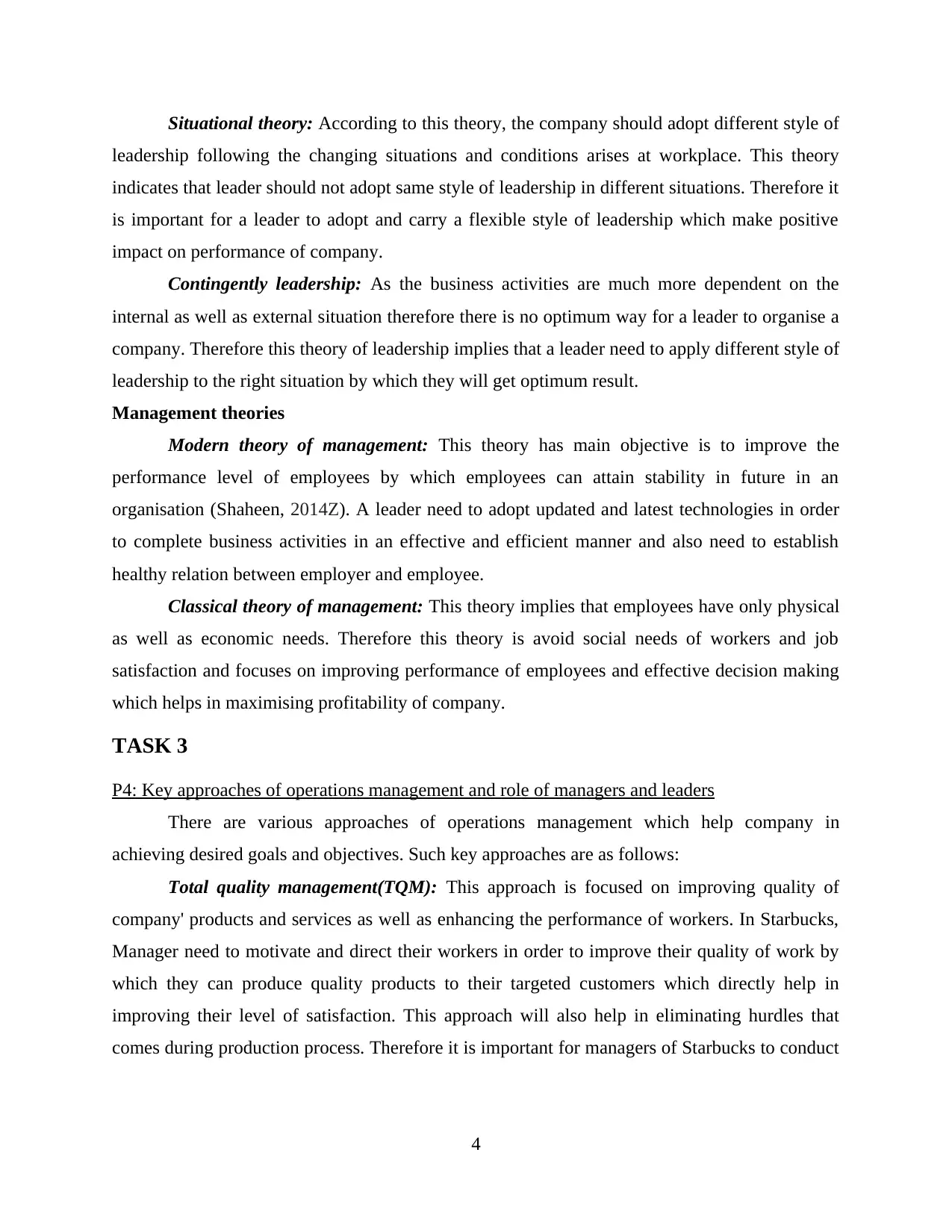
Situational theory: According to this theory, the company should adopt different style of
leadership following the changing situations and conditions arises at workplace. This theory
indicates that leader should not adopt same style of leadership in different situations. Therefore it
is important for a leader to adopt and carry a flexible style of leadership which make positive
impact on performance of company.
Contingently leadership: As the business activities are much more dependent on the
internal as well as external situation therefore there is no optimum way for a leader to organise a
company. Therefore this theory of leadership implies that a leader need to apply different style of
leadership to the right situation by which they will get optimum result.
Management theories
Modern theory of management: This theory has main objective is to improve the
performance level of employees by which employees can attain stability in future in an
organisation (Shaheen, 2014Z). A leader need to adopt updated and latest technologies in order
to complete business activities in an effective and efficient manner and also need to establish
healthy relation between employer and employee.
Classical theory of management: This theory implies that employees have only physical
as well as economic needs. Therefore this theory is avoid social needs of workers and job
satisfaction and focuses on improving performance of employees and effective decision making
which helps in maximising profitability of company.
TASK 3
P4: Key approaches of operations management and role of managers and leaders
There are various approaches of operations management which help company in
achieving desired goals and objectives. Such key approaches are as follows:
Total quality management(TQM): This approach is focused on improving quality of
company' products and services as well as enhancing the performance of workers. In Starbucks,
Manager need to motivate and direct their workers in order to improve their quality of work by
which they can produce quality products to their targeted customers which directly help in
improving their level of satisfaction. This approach will also help in eliminating hurdles that
comes during production process. Therefore it is important for managers of Starbucks to conduct
4
leadership following the changing situations and conditions arises at workplace. This theory
indicates that leader should not adopt same style of leadership in different situations. Therefore it
is important for a leader to adopt and carry a flexible style of leadership which make positive
impact on performance of company.
Contingently leadership: As the business activities are much more dependent on the
internal as well as external situation therefore there is no optimum way for a leader to organise a
company. Therefore this theory of leadership implies that a leader need to apply different style of
leadership to the right situation by which they will get optimum result.
Management theories
Modern theory of management: This theory has main objective is to improve the
performance level of employees by which employees can attain stability in future in an
organisation (Shaheen, 2014Z). A leader need to adopt updated and latest technologies in order
to complete business activities in an effective and efficient manner and also need to establish
healthy relation between employer and employee.
Classical theory of management: This theory implies that employees have only physical
as well as economic needs. Therefore this theory is avoid social needs of workers and job
satisfaction and focuses on improving performance of employees and effective decision making
which helps in maximising profitability of company.
TASK 3
P4: Key approaches of operations management and role of managers and leaders
There are various approaches of operations management which help company in
achieving desired goals and objectives. Such key approaches are as follows:
Total quality management(TQM): This approach is focused on improving quality of
company' products and services as well as enhancing the performance of workers. In Starbucks,
Manager need to motivate and direct their workers in order to improve their quality of work by
which they can produce quality products to their targeted customers which directly help in
improving their level of satisfaction. This approach will also help in eliminating hurdles that
comes during production process. Therefore it is important for managers of Starbucks to conduct
4
⊘ This is a preview!⊘
Do you want full access?
Subscribe today to unlock all pages.

Trusted by 1+ million students worldwide
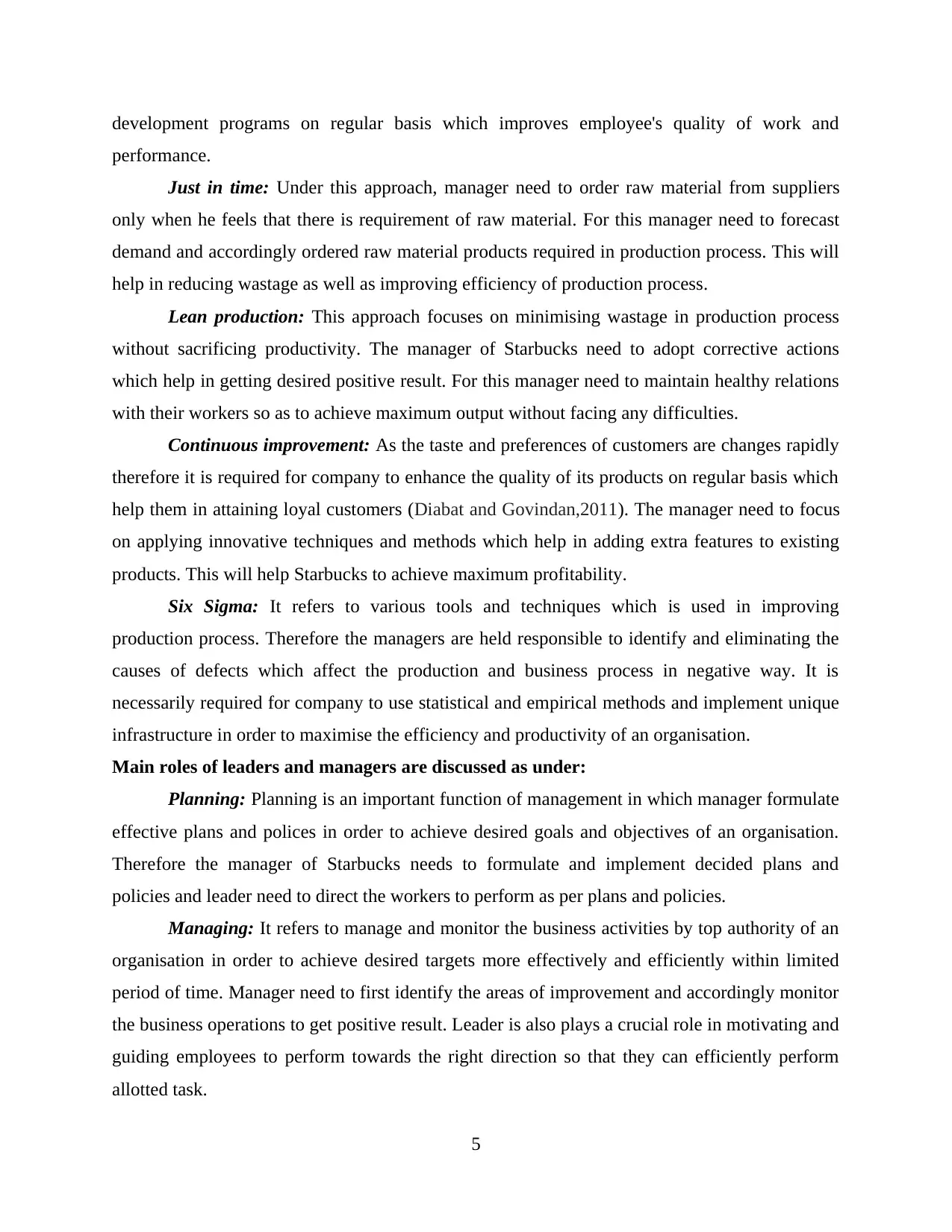
development programs on regular basis which improves employee's quality of work and
performance.
Just in time: Under this approach, manager need to order raw material from suppliers
only when he feels that there is requirement of raw material. For this manager need to forecast
demand and accordingly ordered raw material products required in production process. This will
help in reducing wastage as well as improving efficiency of production process.
Lean production: This approach focuses on minimising wastage in production process
without sacrificing productivity. The manager of Starbucks need to adopt corrective actions
which help in getting desired positive result. For this manager need to maintain healthy relations
with their workers so as to achieve maximum output without facing any difficulties.
Continuous improvement: As the taste and preferences of customers are changes rapidly
therefore it is required for company to enhance the quality of its products on regular basis which
help them in attaining loyal customers (Diabat and Govindan,2011). The manager need to focus
on applying innovative techniques and methods which help in adding extra features to existing
products. This will help Starbucks to achieve maximum profitability.
Six Sigma: It refers to various tools and techniques which is used in improving
production process. Therefore the managers are held responsible to identify and eliminating the
causes of defects which affect the production and business process in negative way. It is
necessarily required for company to use statistical and empirical methods and implement unique
infrastructure in order to maximise the efficiency and productivity of an organisation.
Main roles of leaders and managers are discussed as under:
Planning: Planning is an important function of management in which manager formulate
effective plans and polices in order to achieve desired goals and objectives of an organisation.
Therefore the manager of Starbucks needs to formulate and implement decided plans and
policies and leader need to direct the workers to perform as per plans and policies.
Managing: It refers to manage and monitor the business activities by top authority of an
organisation in order to achieve desired targets more effectively and efficiently within limited
period of time. Manager need to first identify the areas of improvement and accordingly monitor
the business operations to get positive result. Leader is also plays a crucial role in motivating and
guiding employees to perform towards the right direction so that they can efficiently perform
allotted task.
5
performance.
Just in time: Under this approach, manager need to order raw material from suppliers
only when he feels that there is requirement of raw material. For this manager need to forecast
demand and accordingly ordered raw material products required in production process. This will
help in reducing wastage as well as improving efficiency of production process.
Lean production: This approach focuses on minimising wastage in production process
without sacrificing productivity. The manager of Starbucks need to adopt corrective actions
which help in getting desired positive result. For this manager need to maintain healthy relations
with their workers so as to achieve maximum output without facing any difficulties.
Continuous improvement: As the taste and preferences of customers are changes rapidly
therefore it is required for company to enhance the quality of its products on regular basis which
help them in attaining loyal customers (Diabat and Govindan,2011). The manager need to focus
on applying innovative techniques and methods which help in adding extra features to existing
products. This will help Starbucks to achieve maximum profitability.
Six Sigma: It refers to various tools and techniques which is used in improving
production process. Therefore the managers are held responsible to identify and eliminating the
causes of defects which affect the production and business process in negative way. It is
necessarily required for company to use statistical and empirical methods and implement unique
infrastructure in order to maximise the efficiency and productivity of an organisation.
Main roles of leaders and managers are discussed as under:
Planning: Planning is an important function of management in which manager formulate
effective plans and polices in order to achieve desired goals and objectives of an organisation.
Therefore the manager of Starbucks needs to formulate and implement decided plans and
policies and leader need to direct the workers to perform as per plans and policies.
Managing: It refers to manage and monitor the business activities by top authority of an
organisation in order to achieve desired targets more effectively and efficiently within limited
period of time. Manager need to first identify the areas of improvement and accordingly monitor
the business operations to get positive result. Leader is also plays a crucial role in motivating and
guiding employees to perform towards the right direction so that they can efficiently perform
allotted task.
5
Paraphrase This Document
Need a fresh take? Get an instant paraphrase of this document with our AI Paraphraser
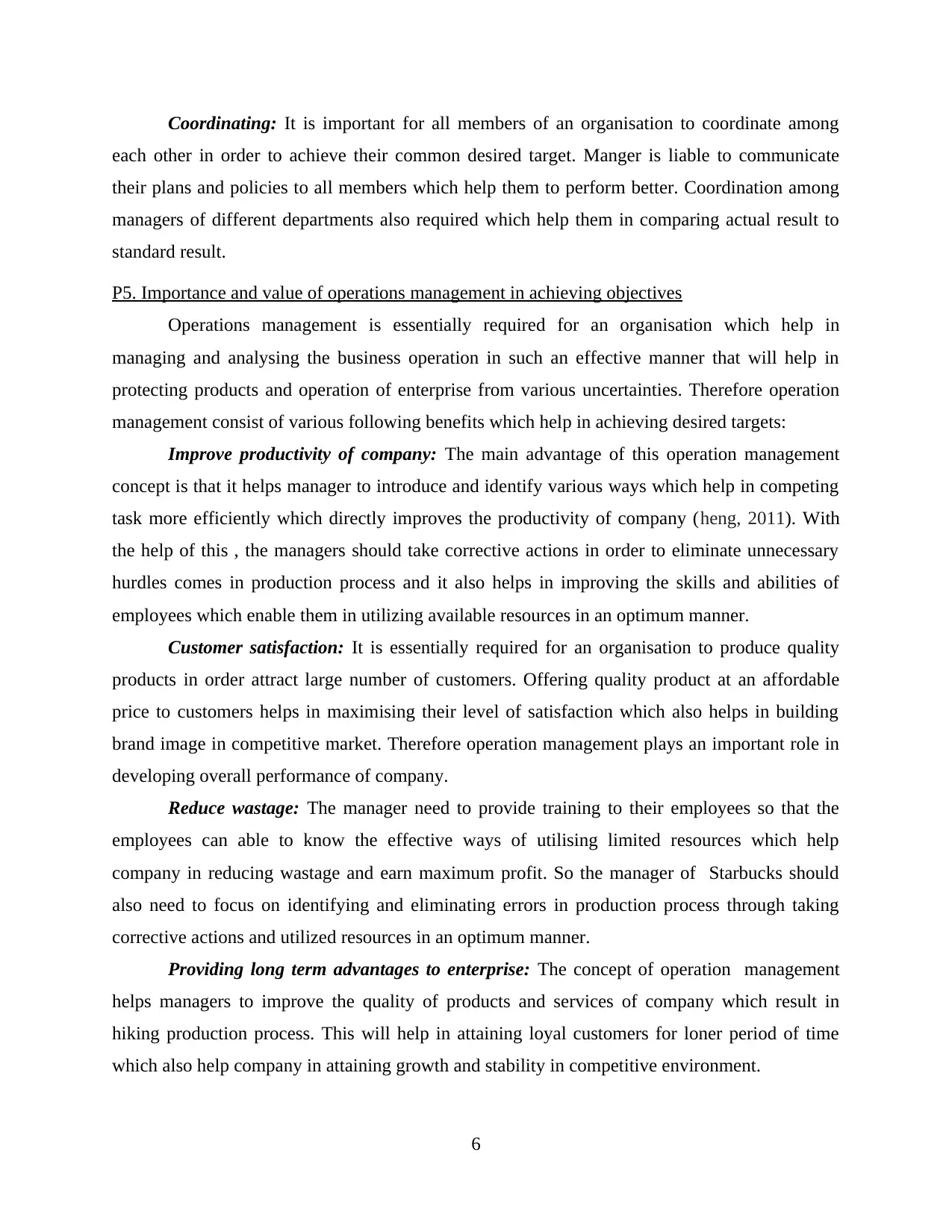
Coordinating: It is important for all members of an organisation to coordinate among
each other in order to achieve their common desired target. Manger is liable to communicate
their plans and policies to all members which help them to perform better. Coordination among
managers of different departments also required which help them in comparing actual result to
standard result.
P5. Importance and value of operations management in achieving objectives
Operations management is essentially required for an organisation which help in
managing and analysing the business operation in such an effective manner that will help in
protecting products and operation of enterprise from various uncertainties. Therefore operation
management consist of various following benefits which help in achieving desired targets:
Improve productivity of company: The main advantage of this operation management
concept is that it helps manager to introduce and identify various ways which help in competing
task more efficiently which directly improves the productivity of company (heng, 2011). With
the help of this , the managers should take corrective actions in order to eliminate unnecessary
hurdles comes in production process and it also helps in improving the skills and abilities of
employees which enable them in utilizing available resources in an optimum manner.
Customer satisfaction: It is essentially required for an organisation to produce quality
products in order attract large number of customers. Offering quality product at an affordable
price to customers helps in maximising their level of satisfaction which also helps in building
brand image in competitive market. Therefore operation management plays an important role in
developing overall performance of company.
Reduce wastage: The manager need to provide training to their employees so that the
employees can able to know the effective ways of utilising limited resources which help
company in reducing wastage and earn maximum profit. So the manager of Starbucks should
also need to focus on identifying and eliminating errors in production process through taking
corrective actions and utilized resources in an optimum manner.
Providing long term advantages to enterprise: The concept of operation management
helps managers to improve the quality of products and services of company which result in
hiking production process. This will help in attaining loyal customers for loner period of time
which also help company in attaining growth and stability in competitive environment.
6
each other in order to achieve their common desired target. Manger is liable to communicate
their plans and policies to all members which help them to perform better. Coordination among
managers of different departments also required which help them in comparing actual result to
standard result.
P5. Importance and value of operations management in achieving objectives
Operations management is essentially required for an organisation which help in
managing and analysing the business operation in such an effective manner that will help in
protecting products and operation of enterprise from various uncertainties. Therefore operation
management consist of various following benefits which help in achieving desired targets:
Improve productivity of company: The main advantage of this operation management
concept is that it helps manager to introduce and identify various ways which help in competing
task more efficiently which directly improves the productivity of company (heng, 2011). With
the help of this , the managers should take corrective actions in order to eliminate unnecessary
hurdles comes in production process and it also helps in improving the skills and abilities of
employees which enable them in utilizing available resources in an optimum manner.
Customer satisfaction: It is essentially required for an organisation to produce quality
products in order attract large number of customers. Offering quality product at an affordable
price to customers helps in maximising their level of satisfaction which also helps in building
brand image in competitive market. Therefore operation management plays an important role in
developing overall performance of company.
Reduce wastage: The manager need to provide training to their employees so that the
employees can able to know the effective ways of utilising limited resources which help
company in reducing wastage and earn maximum profit. So the manager of Starbucks should
also need to focus on identifying and eliminating errors in production process through taking
corrective actions and utilized resources in an optimum manner.
Providing long term advantages to enterprise: The concept of operation management
helps managers to improve the quality of products and services of company which result in
hiking production process. This will help in attaining loyal customers for loner period of time
which also help company in attaining growth and stability in competitive environment.
6
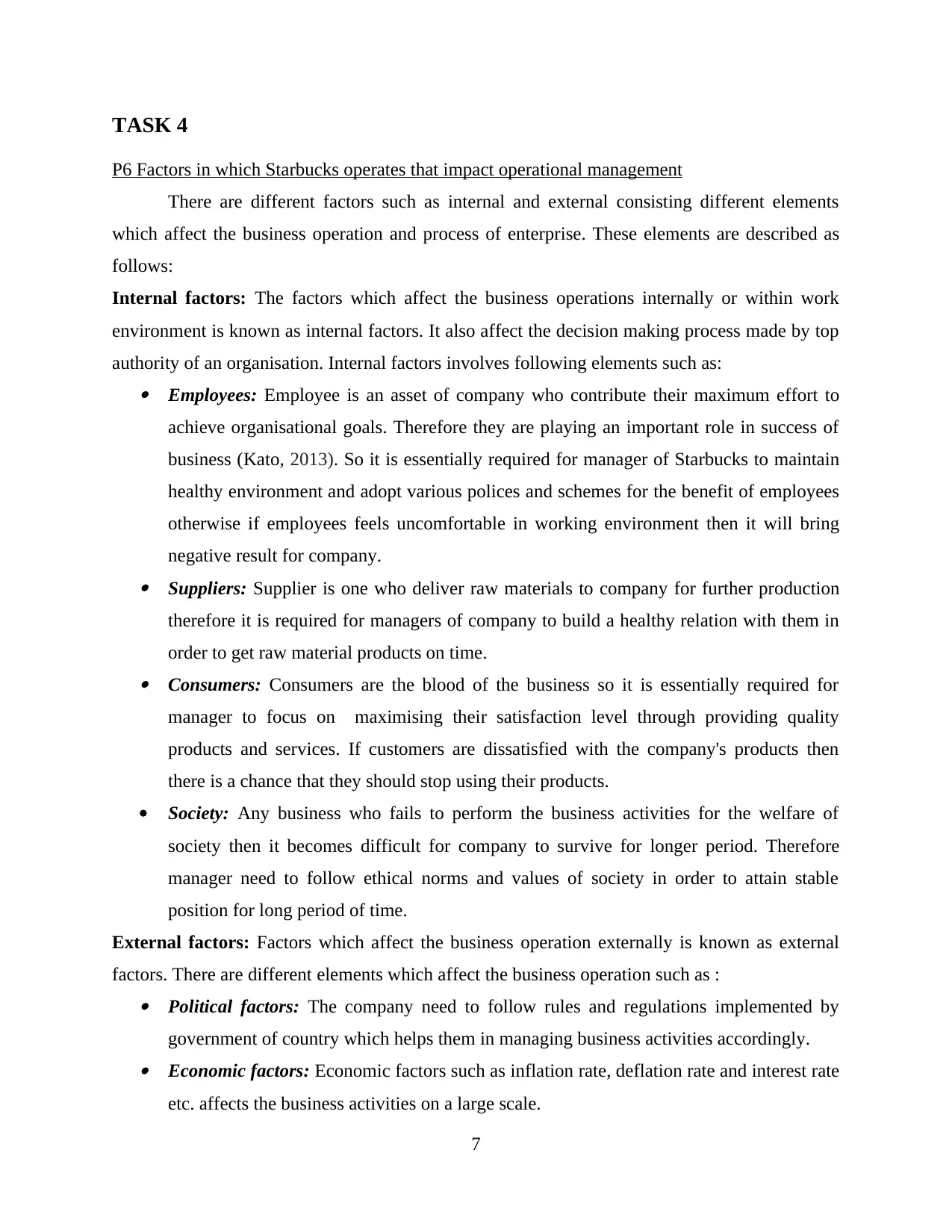
TASK 4
P6 Factors in which Starbucks operates that impact operational management
There are different factors such as internal and external consisting different elements
which affect the business operation and process of enterprise. These elements are described as
follows:
Internal factors: The factors which affect the business operations internally or within work
environment is known as internal factors. It also affect the decision making process made by top
authority of an organisation. Internal factors involves following elements such as: Employees: Employee is an asset of company who contribute their maximum effort to
achieve organisational goals. Therefore they are playing an important role in success of
business (Kato, 2013). So it is essentially required for manager of Starbucks to maintain
healthy environment and adopt various polices and schemes for the benefit of employees
otherwise if employees feels uncomfortable in working environment then it will bring
negative result for company. Suppliers: Supplier is one who deliver raw materials to company for further production
therefore it is required for managers of company to build a healthy relation with them in
order to get raw material products on time. Consumers: Consumers are the blood of the business so it is essentially required for
manager to focus on maximising their satisfaction level through providing quality
products and services. If customers are dissatisfied with the company's products then
there is a chance that they should stop using their products.
Society: Any business who fails to perform the business activities for the welfare of
society then it becomes difficult for company to survive for longer period. Therefore
manager need to follow ethical norms and values of society in order to attain stable
position for long period of time.
External factors: Factors which affect the business operation externally is known as external
factors. There are different elements which affect the business operation such as : Political factors: The company need to follow rules and regulations implemented by
government of country which helps them in managing business activities accordingly. Economic factors: Economic factors such as inflation rate, deflation rate and interest rate
etc. affects the business activities on a large scale.
7
P6 Factors in which Starbucks operates that impact operational management
There are different factors such as internal and external consisting different elements
which affect the business operation and process of enterprise. These elements are described as
follows:
Internal factors: The factors which affect the business operations internally or within work
environment is known as internal factors. It also affect the decision making process made by top
authority of an organisation. Internal factors involves following elements such as: Employees: Employee is an asset of company who contribute their maximum effort to
achieve organisational goals. Therefore they are playing an important role in success of
business (Kato, 2013). So it is essentially required for manager of Starbucks to maintain
healthy environment and adopt various polices and schemes for the benefit of employees
otherwise if employees feels uncomfortable in working environment then it will bring
negative result for company. Suppliers: Supplier is one who deliver raw materials to company for further production
therefore it is required for managers of company to build a healthy relation with them in
order to get raw material products on time. Consumers: Consumers are the blood of the business so it is essentially required for
manager to focus on maximising their satisfaction level through providing quality
products and services. If customers are dissatisfied with the company's products then
there is a chance that they should stop using their products.
Society: Any business who fails to perform the business activities for the welfare of
society then it becomes difficult for company to survive for longer period. Therefore
manager need to follow ethical norms and values of society in order to attain stable
position for long period of time.
External factors: Factors which affect the business operation externally is known as external
factors. There are different elements which affect the business operation such as : Political factors: The company need to follow rules and regulations implemented by
government of country which helps them in managing business activities accordingly. Economic factors: Economic factors such as inflation rate, deflation rate and interest rate
etc. affects the business activities on a large scale.
7
⊘ This is a preview!⊘
Do you want full access?
Subscribe today to unlock all pages.

Trusted by 1+ million students worldwide
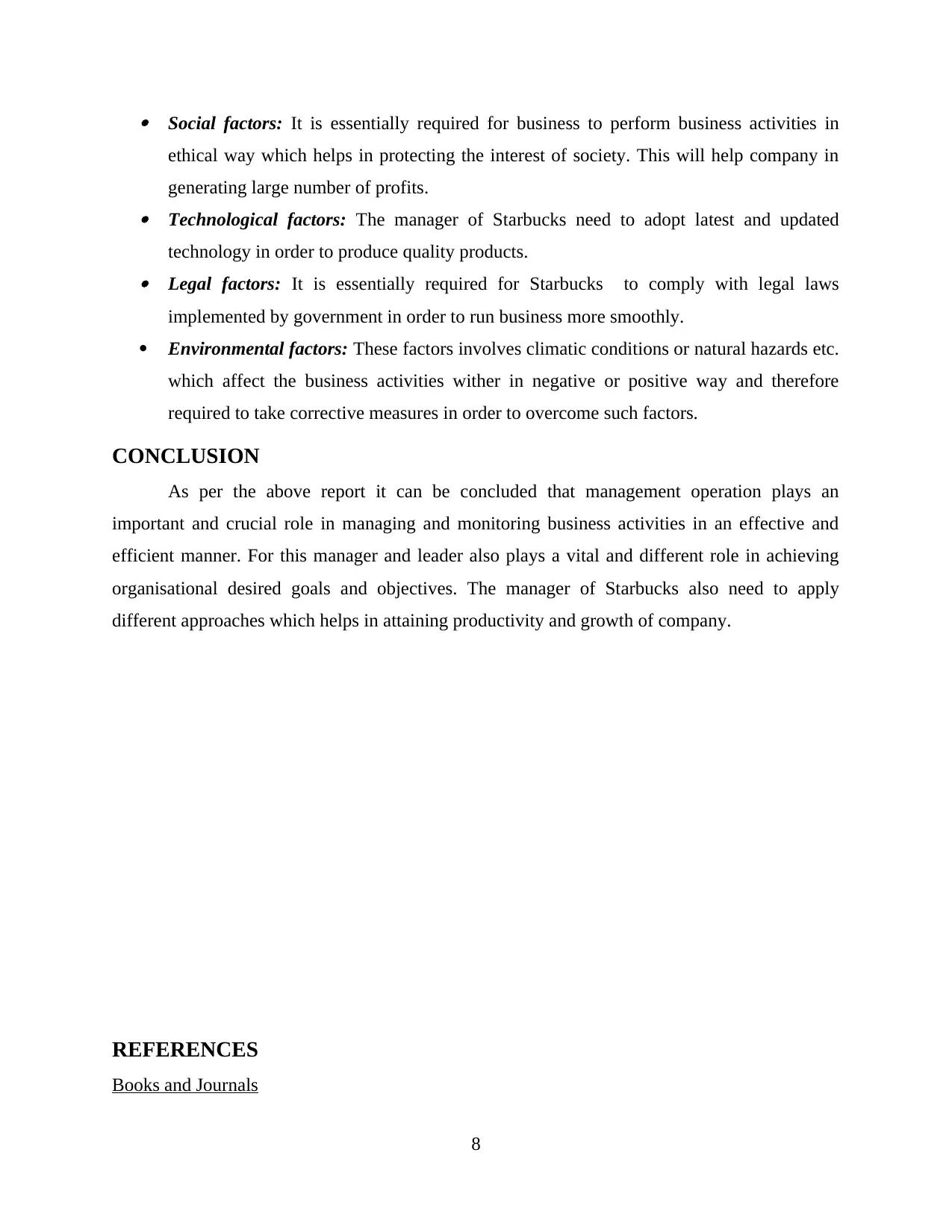
Social factors: It is essentially required for business to perform business activities in
ethical way which helps in protecting the interest of society. This will help company in
generating large number of profits. Technological factors: The manager of Starbucks need to adopt latest and updated
technology in order to produce quality products. Legal factors: It is essentially required for Starbucks to comply with legal laws
implemented by government in order to run business more smoothly.
Environmental factors: These factors involves climatic conditions or natural hazards etc.
which affect the business activities wither in negative or positive way and therefore
required to take corrective measures in order to overcome such factors.
CONCLUSION
As per the above report it can be concluded that management operation plays an
important and crucial role in managing and monitoring business activities in an effective and
efficient manner. For this manager and leader also plays a vital and different role in achieving
organisational desired goals and objectives. The manager of Starbucks also need to apply
different approaches which helps in attaining productivity and growth of company.
REFERENCES
Books and Journals
8
ethical way which helps in protecting the interest of society. This will help company in
generating large number of profits. Technological factors: The manager of Starbucks need to adopt latest and updated
technology in order to produce quality products. Legal factors: It is essentially required for Starbucks to comply with legal laws
implemented by government in order to run business more smoothly.
Environmental factors: These factors involves climatic conditions or natural hazards etc.
which affect the business activities wither in negative or positive way and therefore
required to take corrective measures in order to overcome such factors.
CONCLUSION
As per the above report it can be concluded that management operation plays an
important and crucial role in managing and monitoring business activities in an effective and
efficient manner. For this manager and leader also plays a vital and different role in achieving
organisational desired goals and objectives. The manager of Starbucks also need to apply
different approaches which helps in attaining productivity and growth of company.
REFERENCES
Books and Journals
8
Paraphrase This Document
Need a fresh take? Get an instant paraphrase of this document with our AI Paraphraser
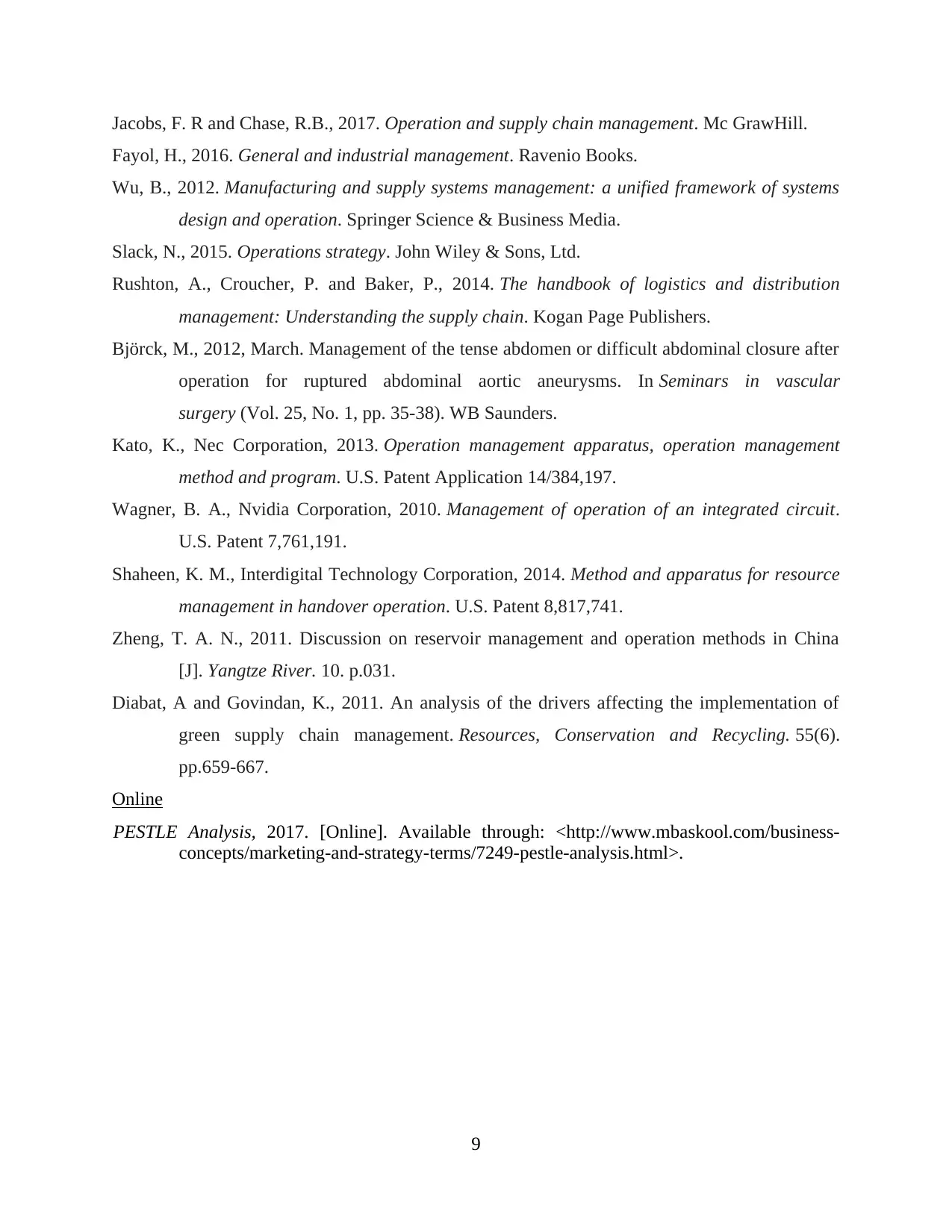
Jacobs, F. R and Chase, R.B., 2017. Operation and supply chain management. Mc GrawHill.
Fayol, H., 2016. General and industrial management. Ravenio Books.
Wu, B., 2012. Manufacturing and supply systems management: a unified framework of systems
design and operation. Springer Science & Business Media.
Slack, N., 2015. Operations strategy. John Wiley & Sons, Ltd.
Rushton, A., Croucher, P. and Baker, P., 2014. The handbook of logistics and distribution
management: Understanding the supply chain. Kogan Page Publishers.
Björck, M., 2012, March. Management of the tense abdomen or difficult abdominal closure after
operation for ruptured abdominal aortic aneurysms. In Seminars in vascular
surgery (Vol. 25, No. 1, pp. 35-38). WB Saunders.
Kato, K., Nec Corporation, 2013. Operation management apparatus, operation management
method and program. U.S. Patent Application 14/384,197.
Wagner, B. A., Nvidia Corporation, 2010. Management of operation of an integrated circuit.
U.S. Patent 7,761,191.
Shaheen, K. M., Interdigital Technology Corporation, 2014. Method and apparatus for resource
management in handover operation. U.S. Patent 8,817,741.
Zheng, T. A. N., 2011. Discussion on reservoir management and operation methods in China
[J]. Yangtze River. 10. p.031.
Diabat, A and Govindan, K., 2011. An analysis of the drivers affecting the implementation of
green supply chain management. Resources, Conservation and Recycling. 55(6).
pp.659-667.
Online
PESTLE Analysis, 2017. [Online]. Available through: <http://www.mbaskool.com/business-
concepts/marketing-and-strategy-terms/7249-pestle-analysis.html>.
9
Fayol, H., 2016. General and industrial management. Ravenio Books.
Wu, B., 2012. Manufacturing and supply systems management: a unified framework of systems
design and operation. Springer Science & Business Media.
Slack, N., 2015. Operations strategy. John Wiley & Sons, Ltd.
Rushton, A., Croucher, P. and Baker, P., 2014. The handbook of logistics and distribution
management: Understanding the supply chain. Kogan Page Publishers.
Björck, M., 2012, March. Management of the tense abdomen or difficult abdominal closure after
operation for ruptured abdominal aortic aneurysms. In Seminars in vascular
surgery (Vol. 25, No. 1, pp. 35-38). WB Saunders.
Kato, K., Nec Corporation, 2013. Operation management apparatus, operation management
method and program. U.S. Patent Application 14/384,197.
Wagner, B. A., Nvidia Corporation, 2010. Management of operation of an integrated circuit.
U.S. Patent 7,761,191.
Shaheen, K. M., Interdigital Technology Corporation, 2014. Method and apparatus for resource
management in handover operation. U.S. Patent 8,817,741.
Zheng, T. A. N., 2011. Discussion on reservoir management and operation methods in China
[J]. Yangtze River. 10. p.031.
Diabat, A and Govindan, K., 2011. An analysis of the drivers affecting the implementation of
green supply chain management. Resources, Conservation and Recycling. 55(6).
pp.659-667.
Online
PESTLE Analysis, 2017. [Online]. Available through: <http://www.mbaskool.com/business-
concepts/marketing-and-strategy-terms/7249-pestle-analysis.html>.
9
1 out of 11
Related Documents
Your All-in-One AI-Powered Toolkit for Academic Success.
+13062052269
info@desklib.com
Available 24*7 on WhatsApp / Email
![[object Object]](/_next/static/media/star-bottom.7253800d.svg)
Unlock your academic potential
Copyright © 2020–2026 A2Z Services. All Rights Reserved. Developed and managed by ZUCOL.





